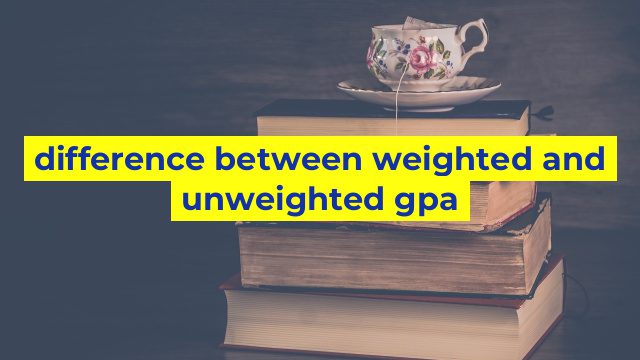The Difference Between Weighted and Unweighted GPA
What is GPA?
GPA stands for Grade Point Average, which is a numerical representation of a student’s academic performance. It is calculated by dividing the total grade points earned by the total number of credits attempted. In simple terms, GPA reflects how well a student has performed academically throughout their high school or college years.
What is Unweighted GPA?
Unweighted GPA is the traditional method of calculating GPA. In this system, all courses are given equal weight, regardless of their level of difficulty or the academic rigor of the course. Each grade is converted into its numerical equivalent on a 4.0 scale, which is then added up and divided by the total number of courses taken.
For example, if a student got A in five courses and B in two courses, the unweighted GPA would be (4.0 x 5) + (3.0 x 2) divided by seven courses, resulting in a GPA of 3.71.
What is Weighted GPA?
Weighted GPA is a more specialized method of calculating GPA that takes into account the level of difficulty of each course. In this system, additional points are added to the numerical grade based on the academic rigor of the course.
For example, an A in an AP (Advanced Placement) course might be worth five points instead of four points for an A in a regular course. Similarly, a B in an honors course might be worth four points instead of three points for a B in a regular course. These additional points are added up and divided by the total number of courses taken to calculate the weighted GPA.
The Key Differences Between Weighted and Unweighted GPA
The main difference between weighted and unweighted GPA is that unweighted GPA gives equal weight to all courses, while weighted GPA gives more weight to courses that are more challenging or rigorous.
Another difference is that weighted GPA may be more beneficial for students who are planning to apply to college, especially if the student has taken advanced courses such as AP or IB (International Baccalaureate) courses. Colleges often take into account the rigor of a student’s courses when considering admissions, so a high weighted GPA may be advantageous.
Ultimately, the choice between weighted and unweighted GPA depends on the educational goals of the student, as well as the policies of their school or college. It is essential to understand these differences to make informed decisions about the courses, grades, and academic trajectories.
Table difference between weighted and unweighted gpa
| Weighted GPA | Unweighted GPA | |
|---|---|---|
| Calculation | Takes into account the difficulty of courses by adding extra points for honors, AP, or IB classes | Does not take into account the difficulty of courses |
| Scale | On a 5.0 or 6.0 scale depending on the school | On a 4.0 scale |
| Importance | Weighted GPA is often more important for college admissions, especially for competitive and selective schools | Unweighted GPA is still important, but may not be the only factor considered |
